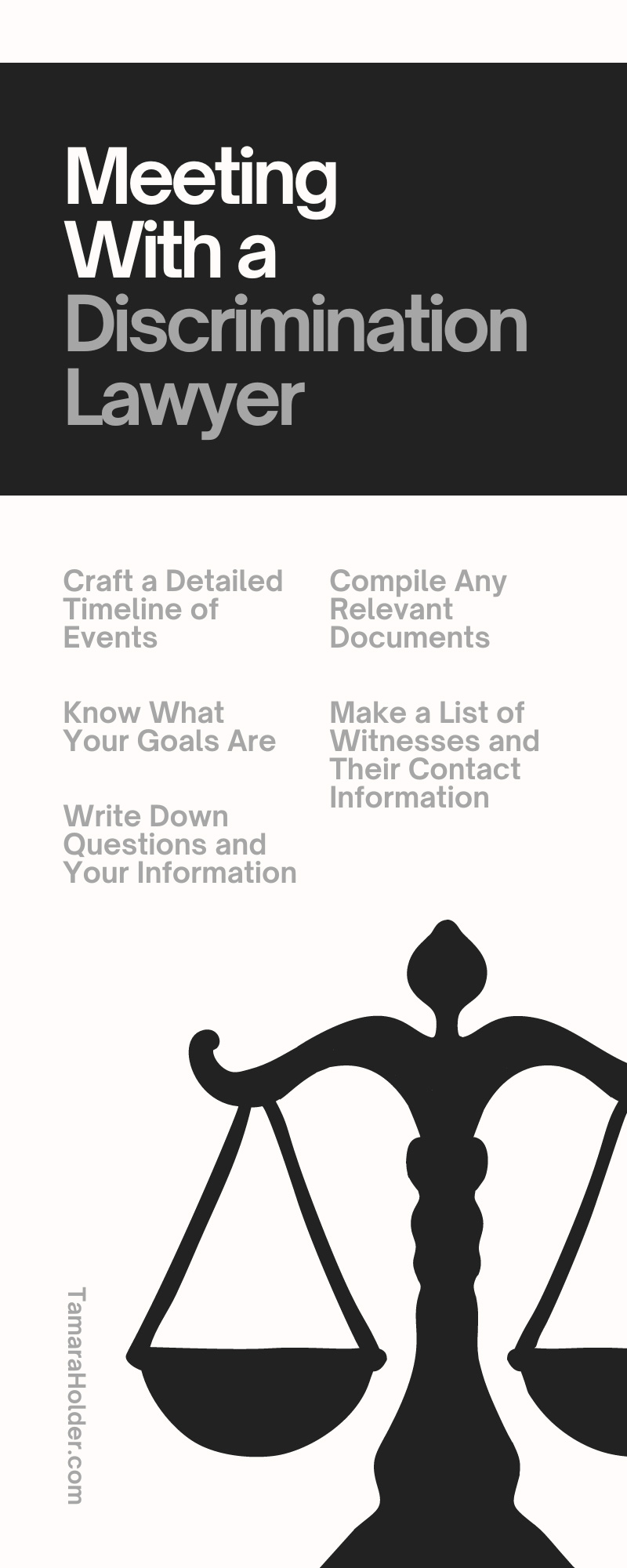Laws, in general, are difficult for the everyday person to navigate. Employment laws are incredibly complex, especially when you get into the details of employment discrimination laws. When you hire an employment lawyer, you’re giving yourself and your case the best chance to succeed. Hiring a discrimination lawyer can help you get through all that legal jargon, tell you if your case holds water, and help you put your best foot forward. But what happens before all that, and how can you best prepare for a meeting with a discrimination lawyer?
It is critical that you craft a record of what happened as soon as possible so that the information is fresh in your memory. You want to be as detailed as possible. You can write down the date, time, what was said, or anything else about the incident that you can recall. If you haven’t done this already, stop and do it now. The longer you wait, the fuzzier the facts will become. You may want to do this digitally. Digital document information can record when you wrote the document, proving that the events recorded were as close to the incident date as possible. Ideally, you’ll want to record the following:
Once you’ve recorded as many details as possible, try to keep everything down to a single page and in the form of a timeline. Having your facts straight and in order will help you and your lawyer craft a refined narrative. It will also become much easier for you to recount events to your lawyer and keep them fresh in your mind for future reference.
Discrimination cases are filled with emotions. While you may know that you have a legal issue on your hands, you have to think clearly about what you want to get out of going to court. Taking some time to ask yourself what you want to get out of this case won’t only benefit you, but it will help your lawyer make an action plan. While your lawyer may not be able to guarantee a perfect outcome for your case, if you provide them with a clear goal, they can certainly shoot for the stars. And you don’t have to stick to one goal, either. You can write down a list of what you achieve. Some common goals are:
Again, while this does not guarantee that you can meet all your goals, this does help point your lawyer in the right direction. By knowing what you want to achieve, you and your lawyer can craft the appropriate narrative.
When you meet with your lawyer, they may have you fill out a questionnaire. Part of this is to help you outline your case and what you’ll need from your lawyer. But it will also likely ask you about your personal information—this is normal. As your case progresses, you will need to keep in close contact with your lawyer. At times they’ll have to contact your place of employment that you’re taking action against. So have your address, email address, phone number, work number, and work address on hand. If they don’t give you a questionnaire, have this information written down or printed out.
You’re also likely to have many questions for your lawyer, and understandably so. While you’re preparing for your meeting, keep a notepad or a place on your phone to write any questions that come to mind. This can be questions about the process or questions about the lawyer or law firm. There’s no shame in asking questions about who’s representing you. Their job is to keep you informed, and you want to make sure you’re employing the right person. Some common process questions include:
Additionally, there are a few critical questions you should ask them before hiring:
To note, while it may seem inappropriate to ask how many cases they’ve won, there’s no need to be shy about it. It’s understandable that you want the best odds. If they don’t have good experience with your case, you’ll know whether you need to move on to another lawyer.
Arguably, compiling relevant documents and information is one of the most important parts of preparation. If your case reaches the discovery phase, it will help immensely. Any emails, prerecorded calls, texts, resumes, contracts, employment policies, and job descriptions should be gathered, and by no means is this list exhaustive. Anything tangible that you can ethically and legally get your hands on that is relevant to your case should be collected.
If someone can attest to what happened or verify past behavior, you should write down their name, contact information, and what you believe they will be able to testify. Even if the witness didn’t directly see the event, they could be instrumental in testifying if something similar happened to them. Most often, discrimination cases require lawyers to prove a pattern of behavior. Having one or more people on the stand who experienced similar issues can help prove that.
Your lawyer will contact them and interview them individually if they consent to be a witness. However, it is important to note that they can change their mind unless they’re summoned or subpoenaed. Usually, you only have to subpoena people if you deem them critical to the case, even if they’re not directly involved.
Now that you know how to prepare for a meeting with a discrimination lawyer, you can go into that meeting with confidence. You may even help your lawyer a lot more than you think. But if you can’t find a lawyer, you feel like you can turn to and trust, workplace discrimination lawyer Tamara N Holder can help. At the Tamara N Holder Law Firm, we care about keeping you informed, representing you to the best of our ability, and getting the results you deserve.
